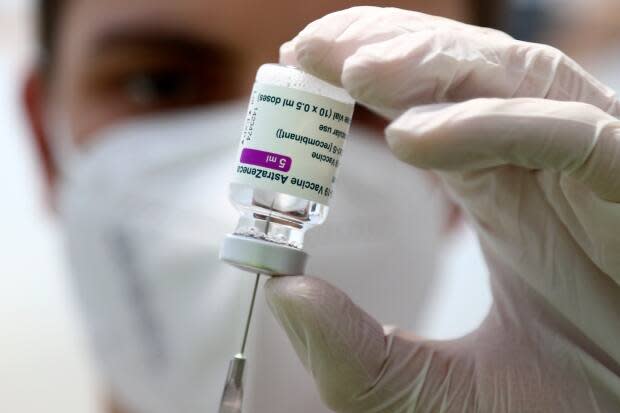Infectious disease experts applaud Alberta's decision to lower age to receive AstraZeneca vaccine

Infectious disease experts are welcoming news that the AstraZeneca-Oxford vaccine will soon be made available to those 40 years of age and older in Alberta.
Alberta will lower the minimum age for the COVID-19 vaccine from 55 to 40 on Tuesday, Premier Jason Kenney announced Sunday via Twitter.
The adjustment means that 575,425 more Albertans will become eligible, and comes after cases of rare blood clots were linked to the AstraZeneca vaccine, prompting reports of vaccine hesitancy and low uptake.
Dr. Jim Kellner, an infectious disease specialist and a member of the federal COVID-19 immunity task force, says lowering the minimum age was likely under consideration as investigations suggested the rarity of adverse reactions.
"What [restricting the age group] left us with was a very good vaccine that was restricted to essentially a 10-year age span," Kellner told the Calgary Eyeopener on Monday.
"So it stands to reason that if you can make that decision safely, it would make sense to broaden the group — and in this case, especially by age — who can get the vaccine."
'The No. 1 thing that can make a difference is vaccination'
Hospitalization numbers are soaring in Alberta, which has the highest active COVID-19 case rate in Canada, and ICU numbers are increasing.
The more dangerous and highly transmissible variant cases continue to surge, and are now the dominant strains, accounting for 54.5 per cent of total active cases.
The first dose of AstraZeneca vaccine reduces the risk of infection by 60 to 70 per cent, while hospitalization and risk of death is reduced by 80 per cent.
However, Alberta Health announced Friday there were more than 170,000 unused AstraZeneca doses in the province.
Officials said part of the issue is hesitancy brought on by reports of extremely rare clots occurring in people who have received AstraZeneca. On April 17, the province confirmed its first case of a blood clot linked to the vaccine.
But it marked only the second instance in Canada after more than 700,000 doses, said Alberta's chief medical officer of health, Dr. Deena Hinshaw.
As the province grapples with its third wave of COVID-19, the risks of falling seriously ill with COVID-19 far outstrip the adverse reactions, Kellner said.
"Cases are going up, hospitalizations are going up, so we're at a very high time [in the third wave] where we know in addition to public health measures, the No. 1 thing that can make a difference is vaccination," Kellner said.
Very safe, very efficient, says specialist
Craig Jenne, an infectious disease specialist with the University of Calgary, also emphasized the rarity of adverse reactions while emphasizing its benefits.
"If we compare this to other drugs — even things that we take for granted as over-the-counter medications, such as aspirin — the complications are normally much higher than this rate of adverse effects," said Jenne.
"This is still a very safe vaccine."
!['If you were offered a specific formulation [of vaccine] and it's your turn, please sign up, get vaccinated and help contribute to to getting this under control here in Alberta,' said Craig Jenne, an assistant professor of microbiology and immunology at the University of Calgary.](https://s.yimg.com/ny/api/res/1.2/VX89bqbaUxYcM_NYrxeQog--/YXBwaWQ9aGlnaGxhbmRlcjt3PTk2MDtoPTU3OA--/https://media.zenfs.com/en/cbc.ca/e00035faf08f76a84f042a341737eed9)
Lowering the age limit for AstraZeneca allows Alberta to target more at-risk Albertans in the absence of increased doses of Moderna or Pfizer-BioNTech vaccines, he said.
The province needs to get shots into the arms of younger age groups most at risk of infection, including those who work in conditions where they can't maintain that physical separation, or have frequent contact with other people.
Meanwhile, according to Jenne, waiting for certain vaccines to become available will overburden the health-care system.
"If you were offered a specific formulation and it's your turn, please sign up, get vaccinated and help contribute to to getting this under control here in Alberta."
Bookings spike after announcement, pharmacist says
Albertans might already be jumping at that chance.
Bukola Akande, a pharmacist at the Hamptons Pharmacy in Edmonton, told CBC News they have received 200 bookings in 24 hours.
"The phone calls and the bookings kind of increased almost 10 times what I usually have daily," Akande said.
Meanwhile Edmontonian Jennie Dailey-O'Cain, 51, said she has already booked an appointment for herself and her partner.
"I was thrilled, I was very excited … and relieved," Dailey-O'Cain said. "I'm feeling pretty good. It's been a rough time."
With files from Jen Lee, Travis McEwan and the Calgary Eyeopener.

 Yahoo Movies
Yahoo Movies 